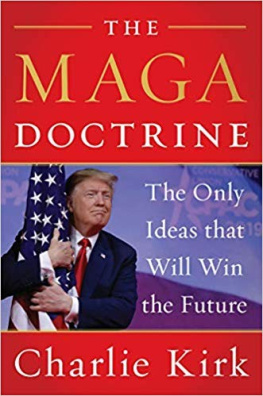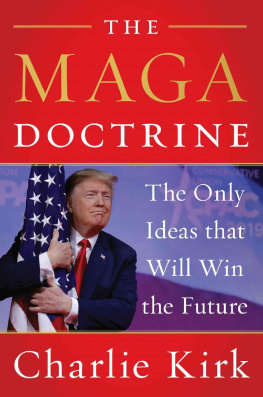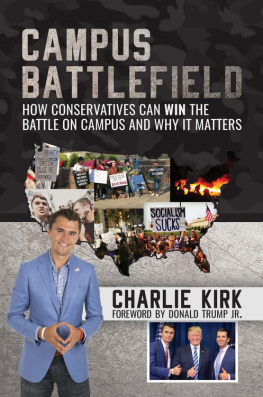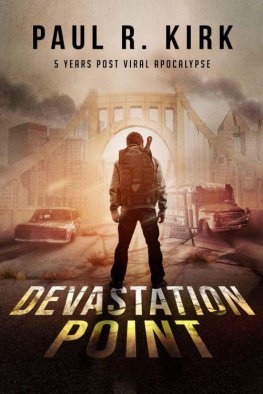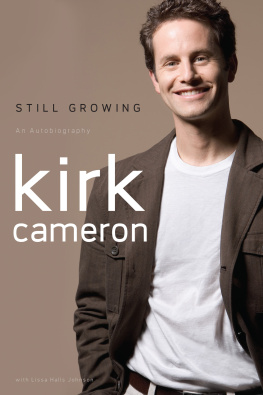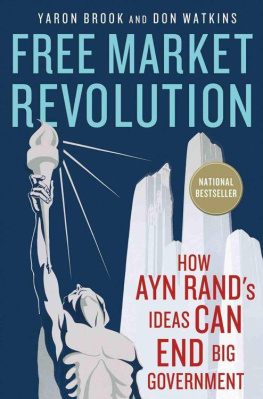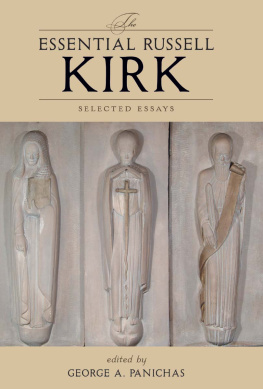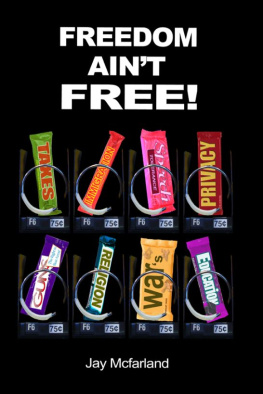
T IME for a
T URNING P OINT
SETTING A COURSE TOWARD
FREE MARKETS AND LIMITED GOVERNMENT
FOR FUTURE GENERATIONS
C HARLIE K IRK
with B RENT E. H AMACHEK
A POST HILL PRESS BOOK
Time for a Turning Point:
Setting a Course Towards Free Markets and Limited Government
for Future Generations
2016 by Charlie Kirk with Brent Hamachek
All Rights Reserved
No part of this book may be reproduced, stored in a retrieval system, or transmitted by any means without the written permission of the author and publisher.
ISBN: 978-1-68261-247-7
ISBN (eBook): 978-1-68261-248-4
Cover Design by Paul Romanowski
Jacket Photographs by Jill Jensen

Post Hill Press
275 Madison Avenue, 14th Floor
New York, NY 10016
posthillpress.com
Printed in the United States of America
1 2 3 4 5 6 7 8 9 10
To my parents, for believing in me
when the world said this couldnt be done.
From Charlie
To Andrea, Sarah, Katy, and all children they may have.
It is for you we write, and it is for you Charlie fights.
From Brent
T ABLE OF C ONTENTS
PROLOGUE
W HY I W RITE, W HY I F IGHT
The only thing necessary for the triumph of evil is for good men to do nothing.
EDMUND BURKE
W riting a book as a 22-year-old is a very humbling experience.
Im so focused each and every day on the work and mission of Turning Point USA, the campus-based activist organization I founded, that I really dont ever stop to consider my age. I dont feel particularly young or old. That said, when I started to consider writing a book, it did make me wonder about the audacity (admission here that Barack Obama has made me cringe slightly at the use of that word) of the task and to wonder just how often in history other young people have attempted to impact the world with the written word.
So I turned to Google, that wonderful company born of a still relatively free market that has managed to turn a nonsensical company name into one of the most frequently used verbs in our language, and I googled famous authors under age 23. Google showed me that there were roughly 289 million search results and I, being like so many other millennials and always in a hurry, selected the first suggestion on the first page: 23 Writers who were famous by the age of 23.
There were a few things that surprised me. First, I had no idea that Mary Shelley was only 20 years old when she finished the manuscript for Frankenstein . (How could such a young mind have such a tortured view of medical science without exposure to Obamacare?) Second, imagine that at the tender age of only 20 Helen Keller had already experienced and overcome so much adversity in her life that she could write an autobiography. The third thing that struck me is that aside from Shelley and Keller, there were not many names on the list I recognized.
So this is not something that is done frequently by people my age.
Since so many supporters of my activities like to metaphorically equate the work we are doing with a war to restore American First Principles, I thought I would again turn to Google and google famous young military leaders. Im not for a minute positing that my efforts compare to those of a soldier in battle, but I thought the perspective would be interesting.
Alexander the Great, tutored by Aristotle and the seated King of Macedonia in 336 BC at the age of 20, was setting out on his first military campaign by the age of 21. When she was only 17, St. Joan of Arc led the French in driving back the English from Orleans in 1429. In 44 BC, 18-year-old Gaius Octavius, later to be Caesar Augustus, led an army of 3,000 into Rome and drove out Caesars assassins.
Three great young leaders, two of whom met with fates that could easily cause me to reconsider my efforts if I felt the war to restore America were other than a metaphor.
Finally, I decided to search famous young political leaders, since my efforts seem to make me most comfortably fit into that category. Surprisingly there were not a lot of meaningful results. I did learn that Egypts famous boy-king Tutankhamun likely died as the result of sustaining severe traumatic injuries at the age of 19.
So there are numerous well-known names, many tragic endings, and some incredible accomplishments that have become the stuff of legends and sainthoods. But Im not any of those people.
Im just a 22-year-old who loves individual freedom.
I am writing this book as a young man who quite deliberately has chosen to commit my still early life to fighting to restore, perhaps finish building, an America that was envisioned by our Founding Fathers. It is disheartening to think that even the term Founding Fathers has fallen into a state of disrespect in recent times. The derogatory acronym DWEMS (dead white European males), which became popular in my parents youth, is now replaced by more direct and caustic terms like racist, supremacist, and imperialist when discussing Jefferson, Madison, and Washington.
Those Founding Fathers, as an aside, do provide remarkable insight into the power of youth when it is joined together. Many of those Founders were quite young when the Declaration was signed in 1776. Hamilton (21), Burr (20 ), Monroe (18), Stuart (20), Madison (25), Ross (24 ), Lafayette (18) were all in the age range of todays college undergrad or postgrad student. Even an old man like Jefferson (33 in 1776) would qualify today as a millennial.
An entire generation of American youth is being taught to distance themselves from these people and Americas beginnings. They are being taught that what was written in the Constitution isnt really what the Founding Fathers meant, or certainly isnt what they would have meant if they knew all the things we know today. The arrogance and condescension with which the idealists of 1776 are viewed in the early 21st century makes me angry, makes me saddened, makes me want to fight back. The quotation from Edmund Burke that began this chapter is one that hung on the wall of an 8th grade classroom of mine and one that I have made part of my core values ever since.
With the hostility to the people and principles of Americas Founding comes hostility to capitalism and free markets. If somebody comes to the conclusion that individual liberty is synonymous with oppression, then the next logical conclusion for them to draw is that economic liberty is tantamount to indenturing the masses. The people who have had a strong philosophical influence on me (Hayek, Mises, Bastiat, Friedman) have led me to believe otherwise. There may not be a simpler sentence that better reflects an incontrovertible truth than the one used by Milton Friedman and others that there is no political freedom without economic freedom.
This deep and abiding belief in free markets and individual liberty is what drove me to start Turning Point USA immediately upon my graduation from high school, and what is now driving me to write this book. I dont for a minute believe that my commitment to these systems and values is any greater than was the commitment of great defenders of liberty who came before me. I do, however, recognize and feel an obligation to continue their fight using my energy, my passion, and my insight. I also intend on using the weapons of my time. Imagine what the oft-quoted quipmaster Benjamin Franklin could have done with Twitter!
One of the challenges I faced in approaching this project was how to separate myself and my own opinions and ideas from the activities and the mission statement of Turning Point. After all, this book hits the market as an offering of Charlie Kirk, not as a Turning Point USA issues pamphlet. After struggling with the concept, I finally realized that I cannot separate myself from Turning Point, because Turning Point and I share the identical goals. What Turning Point has become is the stronger, bigger, and faster version of everything that I have wanted to be.
Next page

